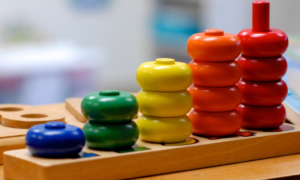
Dyscalculia Signs
Dyscalculia signs vary from person to person and with age, whereby some children may show symptoms as early as pre-school and others may display difficulty with maths at the middle-school level. Even then, dyscalculia may be harder to spot as all children have a problem with maths from time to time. Still, the thing to remember with dyscalculia is that the acquired mathematical skills will be much lower than the child’s age. Any math-based task or activity can frustrate children with dyscalculia and cause them to feel extreme discomfort.
Dyscalculia signs among pre-schoolers
- Difficulty in sorting objects by shape, size or colour
- Problem in connecting numbers to groups or things, like associating the number four with groups of things that may be in fours such as four balloons, four kids, or four apples. Trouble recognising patterns like greatest to smallest, or shortest to tallest

- Forgetting essential facts due to poor memory when it comes to numbers
- Not understanding what to do when tasks that involve numbers present themselves like “get the third jar from the left” or “bring the plate with five biscuits on it.”
Dyscalculia signs among primary school children
- Still trying to understand a basic concept while the class has moved on to one a little more complex
- May act up or irrationally behave when it is time for math class in school or math homework at home
- Troubling learning and remembering mathematical facts, like 2 + 3, is the same as 3+2.
- Not being able to understand that the number “5” is the same as the word five and that both mean the same thing
- Difficulty in understanding different symbols such as +.
- Trouble with counting and mental math

- Using fingers for counting or demonstrating a number with fingers rather than saying what it is
- Difficulty in comprehending word problems.
- Trouble with linking “clue words” to math operations whereby the child isn’t able to solve word problems
- May avoid games that require maths such as Monopoly
Dyscalculia signs in teens and adults
- Difficulty understanding graphs and charts (visual-spatial concepts)
- Struggling to understand word math-problems
- Difficulty in remembering timetables
- Trouble with remembering numbers, or their visual representations
- Struggling with time-telling and trouble reading clocks
- Trouble with making comparisons even if the differences seem glaringly obvious
- Avoiding games that involve math skills or strategies, e.g. card and board games
- Trouble with making phone calls
- Struggling with directions and moving about in new places and unwillingness to explore new places on their own
- Unwillingness to wear a watch despite a requirement
- May use a calculator to answer fundamental math problems
- Getting anxious or freezing with questions that are related to doing math
- Struggles sticking to a budget as they cannot apply basic maths concepts to money

- Frequently running late and missing important events due to difficulty sticking to a schedule
- Have trouble in judging speed and distance, like running too fast in the first lap but completely feeling exhausted by the second
- Losing track of time very often
- Trouble in understanding the logic behind math and finding different approaches to the same maths problem
- Struggling with counting money